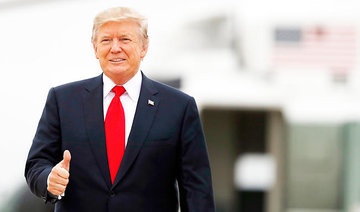SEOUL: President Donald Trump warned the “cruel dictatorship” of North Korea against underestimating the United States Wednesday, but offered leader Kim Jong-Un a better future if he gives up his nuclear ambitions.
In an address to the South Korean parliament — the first by a US president for 24 years — Trump painted a dark picture of Pyongyang as an oppressive, despotic regime.
He called on the world to act, specifically singling out the North’s allies China — where he was headed for later Wednesday — and Russia.
“North Korea is a country ruled as a cult,” the US leader declared, a year to the day after his election victory.
“At the center of this military cult is a deranged belief in the leader’s destiny to rule as parent protector over a conquered Korean peninsula and an enslaved Korean people.”
Analysts said the criticisms could provoke a reaction from the North.
But South Korean lawmakers applauded as the US president, whose tour of Asia has been dominated by fears over the nuclear-armed North, vowed not to be intimidated and warned Pyongyang it should not test American resolve.
The North carried out its sixth nuclear test in September, by far its most powerful to date, and has fired dozens of missiles in recent months.
Two have overflown key US ally Japan, and Pyongyang says it can mount a nuclear warhead on a rocket with the US mainland within range.
“We will not permit America or our allies to be blackmailed or attacked,” Trump said, or “allow American cities to be threatened with destruction.”
Ahead of his meeting with Chinese President Xi Jinping — whose country is responsible for about 90 percent of the North’s commerce — Trump called on the world to unite against the threat from Pyongyang.
“You cannot support, you cannot supply, you cannot accept,” he said, urging China and Russia to fully implement UN sanctions, downgrade diplomatic ties, and sever all trade and technology ties.
Earlier, Trump was forced to abandon a surprise visit to the Demilitarized Zone (DMZ) that divides the two Koreas because of bad weather, leaving him “pretty frustrated” according to the White House.
South Korean President Moon Jae-In, who had flown earlier before fog closed in, was left waiting for him at a guard post on the border, which bristles with electric fences, minefields and anti-tank barriers.
In his speech, Trump described the DMZ as “the line that today divides the oppressed and the free,” where “the flourishing ends, and the prison state of North Korea sadly begins.”
The Kim dynasty has ruled the impoverished, isolated North with an iron fist and pervasive personality cult for three generations, showing no tolerance for political dissent.
The regime has for decades been criticized for a range of rights abuses including torture, rape and execution of perceived critics or those trying to flee the country.
It is also known to operate prison camps where hundreds of thousands languish under forced labor, and its 25 million people are barred from contact with the outside world such as foreign television or Internet access.
While Trump condemned the authorities, he also made overtures to leader Kim Jong-Un, who has overseen rapid advances in its weapons technology.
In what he said was a direct message to the country’s young leader, he told him: “The weapons you are acquiring are not making you safer. They are putting your regime in great danger.
“North Korea is not the paradise your grandfather envisioned,” he went on. “It is a hell that no person deserves.”
“Yet despite every crime you have committed against God and man, we will offer a path toward a much better future.”
It would have to begin, though, with the North stopping ballistic missile development, Trump said, and “complete verifiable and total denuclearization.”
Analysts said the speech could go down badly in Pyongyang, which is particularly sensitive to criticism of its leaders.
Go Myong-Hyun, of the Asan Institute of Policy Studies in Seoul, said the open criticism of the realities in North Korea diminished the prospect of talks.
“The message he delivered was that the US will not open dialogue on North Korea’s terms,” he said.
Yang Moo-Jin from Seoul’s University of North Korean Studies said he was “very disappointed.”
“The first half seemed like a press conference given by a North Korean defector,” he said, while Trump’s message that the North’s nuclear program will not be tolerated was “nothing new.”
But labelling Kim a “cruel dictator” could be “enough to provoke North Korea because the North Korean system puts the most importance on the dignity of its leadership,” he said.
Ahead of the speech the North’s RodongSinmun newspaper, the mouthpiece of the ruling Workers’ Party, condemned Trump’s visit, calling it “a deliberate scheme aimed at strengthening military threats against us and to light the fuse of nuclear war.”




























